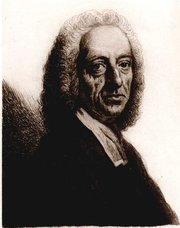William Whiston
|
|
William Whiston (December 9, 1667 - August 22, 1752), English divine and mathematician, was born at Norton in Leicestershire, of which village his father was rector. He is probably best known for his translation of the Antiquities of the Jews by Josephus, his A New Theory of the Earth, and his Arianism.
He was educated privately, partly on account of the delicacy of his health, and partly that he might act as amanuensis to his father, who had lost his sight. After his father's death, he entered at Clare College, Cambridge, where he applied himself to mathematical study, and obtained a fellowship in 1693. He next became chaplain to John Moore (1646-1714), the learned bishop of Ely, from whom he received the living of Lowestoft in 1698.
His A New Theory of the Earth (1696), an articulation of Creationism and flood geology which held that the global flood of Noah had been caused by a comet, obtained the praise of both Newton and Locke, the latter of whom classed the author among those who, if not adding much to our knowledge, "At least bring some new things to our thoughts." In 1701 he resigned his living to become deputy at Cambridge to Sir Isaac Newton, whom two years later he succeeded as Lucasian professor of mathematics. Here he engaged in joint research with his junior colleague Robert Cotes, appointed with Whiston's patronage to the Plumian professorship in 1706.
In 1707 he was Boyle lecturer. For several years Whiston continued to write and preach both on mathematical and theological subjects with considerable success; but his study of the Apostolical Constitutions had convinced him that Arianism was the creed of the primitive church. For Whiston, to form an opinion and to publish it were things almost simultaneous. His heterodoxy soon became notorious, and in 1710 he was deprived of his professorship and expelled from the university. The rest of his life was spent in incessant controversy--theological, mathematical, chronological, and miscellaneous. He vindicated his estimate of the Apostolical Constitutions and the Arian views he had derived from them in his Primitive Christianity Revived (5 vols., 1711-1712).
In 1713 he produced a reformed liturgy, and soon afterwards founded a society for promoting primitive Christianity, lecturing in support of his theories in halls and coffee-houses at London, Bath and Tonbridge Wells. One of the most valuable of his books, the Life of Samuel Clarke, appeared in 1730. While considered heretical on many points, he was a firm believer in supernatural Christianity, and frequently took the field in defense of prophecy and miracle, including anointing the sick and touching for the king's evil. His dislike of rationalism in religion also made him one of the numerous opponents of Benjamin Hoadly's Plain Account of the Nature and End of the Sacrament.
He held that Canticles was apocryphal and that the Book of Baruch was not. He was fervent in his views of ecclesiastical government and discipline, derived from the Apostolical Constitutions, on the ecclesiastical authorities. He challenged the teachings of Athanasius. He challenged Sir Isaac Newton's Biblical chronological system with success; but he himself lost not only time but money in an endeavour to solve the problem of longitude.
Of all his singular opinions the best known is his advocacy of clerical monogamy, immortalized in the Vicar of Wakefield. Of all his labours the most useful is his translation of Josephus (1737), with valuable notes and dissertations, often reprinted. His last "famous discovery, or rather revival of Dr Giles Fletcher's," which he mentions in his autobiography with infinite complacency, was the identification of the Tatars with the lost tribes of Israel. In 1745 he published his Primitive New Testament. About the same time (1747) he finally left the Anglican communion for the Baptist, leaving the church literally as well as figuratively by quitting it as the clergyman began to read the Athanasian creed. He died in London, at the house of his son-in-law, on the 22nd of August 1752, leaving a memoir (3 vols., 1749-1750) which deserves more attention than it has received, both for its characteristic individuality and as a storehouse of curious anecdotes and illustrations of the religious and moral tendencies of the age. It does not, however, contain any account of the proceedings taken against him at Cambridge, these having been published separately at the time.

